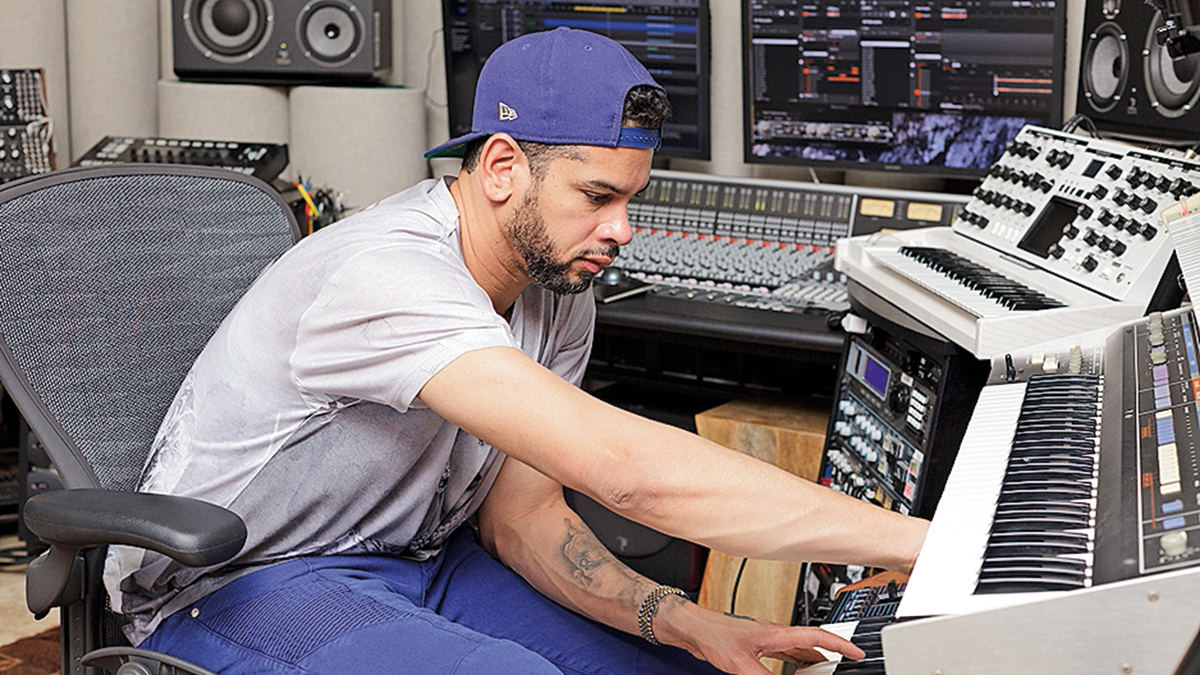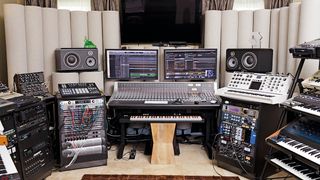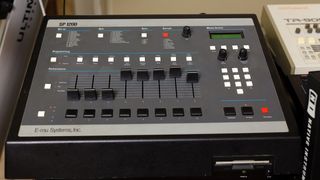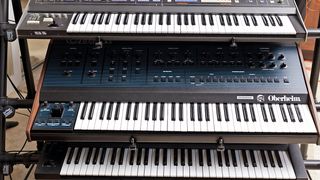MK talks tech, technique and Hollywood A-listers
LA-based producer on his jam-packed career to date

American DJ and house producer Marc 'MK' Kinchen's extraordinary story is inspirational. From the age of 14, MK set his heart on writing and producing for some of the biggest artists in music, and within little over a decade was doing just that.
By the age of 21, MK had already scored No 1 hits in the US with the classic house anthems Always and Love Changes under the pseudonym Nightcrawlers. Within two years, he was remixing tracks by Pet Shop Boys, Celine Dion and Bobby Brown, and by age 26 MK was introduced to Quincy Jones, who opened his path to a career in production where he's worked with megastars including Will Smith, Jay-Z, Snoop Dogg, Rihanna and Beyonce.
Having co-written the theme song to Men In Black 3 with rapper and producer Pitbull, MK now has his heart set on a career in sound design for the film industry, but not before he's recorded a follow-up to his debut album Surrender, released over two decades ago in 1993.

How did you come across Kevin Saunderson who was a mentor to you?
"Well, basically, I did my first techno record when I was about 16. A local record company put it out and a year later Kevin was doing a compilation of Detroit techno and licensed this song that I'd made. That's kind of how we met, because he wanted to hear what else I had. He pretty much liked what I was doing and kept inviting me down to his studio to work on music. To be in that position from such a young age was surreal."
Where did you draw your influences from in those days?
"At that time it was Depeche Mode and a lot of '80s alternative electronic music, which had a lot of synths going on. The likes of Howard Jones and Thomas Dolby would always use very cool equipment, and that got me into wanting to produce. Although I did have a band when I was in high school, I always made sure we'd be using synths and electric drum machines."
Get the MusicRadar Newsletter
Want all the hottest music and gear news, reviews, deals, features and more, direct to your inbox? Sign up here.
What gear did you buy?
"The first thing I ever bought was a small white Casio keyboard called a PT-1, which had a speaker on it and the keys were like the size of your fingernails. I think it had an onboard sequencer, but just one track, nothing crazy, and a built-in drum machine. Then I got a Juno-106; I had every family member save up and give it to me as a present."
You had some huge house hits in '93/'94 as Nightcrawlers. How do you think the genre has evolved since then?
"I always think that house music is one of the easiest types of music to get into. Even people that have never really heard of house will automatically like it if you play them the right type of track. It's pretty simple: four-on-the floor with a very simple bassline that doesn't have too much going on and it's usually really catchy and repetitive with a pretty basic drum beat.
"Now people have taken that basic element and popularised it; that's why there's so many genres of house music like tech house, deep house and progressive house. It's all in there, but if you're smart you don't want to lose what made it popular.
"If you take what made rock 'n' roll popular, it was the guitar - and you don't really wanna do a rock song without the electric guitar. You wanna keep those basic elements that work and add to that without going too far left field."
Your new single, Piece Of Me, definitely retains that classic old-school house sound…
"Yeah, exactly, that's how I try to keep it. Usually when I start my tracks I begin with the basic elements of a kick, clap and a hi-hat and try to build from there. Eventually, I'll replace some of the sounds and then I'll continue from that point."
Do you adopt the same attitude to remixing?
"Before I agree to do a remix, I'll listen to the entire song, give it a quick once over and then, if I agree to mix it, they'll send me the parts and I'll usually just take the vocals, wipe everything else and start from there. I start playing it in acapella mode and then go through my sounds and all the different patches to see what inspires me. Once I have a basic skeleton of a song I'll take the vocals away and just start working on the music a little more before bringing the vocals back in to see how it all fits together."
In tandem with the single, I understand you're relaunching your own Area10 label?
"When I was working with Kevin Saunderson, he had his own record label called KMS. I saw how he did everything and it was pretty easy, so it was more just a way for me to put my music out in the early '90s. I had a song called Burning that I made, but nobody seemed to like it, so I just figured I'd start a record label and put it out myself. I used to work on a parking lot in Detroit called Area10. I always thought that was a cool name, so I called it Area10 Records.
"I didn't have any artwork, so I made a black label with Area10 written on it, called it Burning and put my phone number on the vinyl. Because I didn't have any money, I sent the distributors a cassette of the song and they ordered 1,000 or 2,000 copies, then I asked if it was okay if I fielded the orders to them and they agreed. So when the vinyl came, they sent the money directly to the pressing plant who took out their cut for pressing the record and sent me what was left over. So it was a win, win for everyone."
Was that when Virgin Records called you up?
"Yeah, maybe a year later someone from Virgin Records called me and said they thought it was a great record. I told them it's available if you want it, so they signed me. Once Virgin had signed me, I started doing remixes and wasn't interested in running the label anymore because I really wanted to be a label artist and producer. But now it makes sense to get back into it, because part of my project is signed to Sony Columbia throughout the world, but not North America."
After your initial success, there was a big gap between 1997 and 2011. Was that because you had moved into production?
"Yeah, that's exactly what it was. I just got tired of doing the House stuff because I was getting so many remixes and everyone wanted it to sound like Nightcrawlers. I wanted to write music and at the time remixing was still quite a new thing, so I was wondering if I could actually make a career from remixing or whether I'd better start doing something else before the whole remix era died down. It didn't though [laughs]."
What's your view on remixing today?
"I even argue with people who want to work with me about remixing. For Piece Of Me, they said we need to hire remixers but I was adamant about the style of remix to do. It was like, I don't want this person to do it just because they sound like MIA - I'm not one for just blowing out remixes. I prefer to go back to the late '80s when I heard a Depeche Mode remix that would give you something from the original that was still cool. I think the whole remix thing's been a little bit abused now."
You know, Depeche Mode is the one I've been waiting for but it's never happened."
You've remixed so many artists. Are Depeche Mode a band you ever got the chance to remix?
"You know, Depeche Mode is the one I've been waiting for but it's never happened. I think I put it out there that I wanted to do it and hoped that somebody who knows them would run with it. But it'll happen one day, hopefully [laughs]."
How did you move from remixing to producing?
"Well, since I was 14 I always wanted to be a producer. I didn't plan on being a DJ, remixer or even a house producer. I just wanted to be a songwriter and producer, and my ultimate goal was to do that for big artists.
"Around 1996 I met a guy named Jay Brown who's now partners with Jay-Z, but Jay worked with Quincy Jones. So at that time, Jay heard my music and said he wanted to take it to Quincy because he thought he would like the music.
"So he took me to Quincy and they signed me to a publishing deal and started just fitting me in with a lot of different artists to see if I could write and produce songs for them. So I would basically work on music at home, make a demo song and submit it to these different artists, and I ended up getting a lot of placements doing that. Sometimes they would give me a song and ask me to make it better, update it or make it more current."
That must have been amazing…
"It was fun, but then I started realising what a rat race it was because there were a lot of producers in the same boat as me sitting at home all day writing songs and submitting them. At the time the whole music industry started to crash; after Napster, producers were almost producing songs for free because labels didn't want to spend that type of budget for a song.
"Back in the '90s, a label would spend 30 grand on a song for me to produce and it might not even make the album, but you'd still make that money and get to record with the artist. So it got to a point where they would only pay for ten songs and I was spending six months trying to produce a song for Usher and he may not even get it.
"That started to happen more and more often, so I knew this was going to be tricky. Then I met Will Smith during the time I worked with Quincy, as someone from Will's camp said he was looking for an in-house producer and wanted to use me if I was down with it.
"They said they'd put me on a salary, but the cool part was they told me to make a list of any equipment that I wanted because they were going to build me a studio. I was like, what!? So I literally made a list - a crazy list, and they got it all."
Elsewhere on MusicRadar
The 50 best VST/AU plugin synths in the world today
Retro buyer's guide: vintage synths and more
9 ways to get a better drum mix
Free music samples: download loops, hits and multis
Can you remember what was on that list?
"I can't remember now, but I know it was a new Mac with Logic. There weren't that many virtual synths yet, but I think they got me an Akai MPC2000, a load of keyboards and quite a lot of rackmount gear too."
What was it like working with Will Smith compared to other artists you'd worked with?
"He gets very involved and knows what he wants. Some artists go in and they don't even know how to tell you what they want, but Will knew exactly what he wanted and would tell you how he would want a song to be, or how he wanted it to feel, like Fat Joe's Lean Back - he wanted a track to have that feel to it. So he made it really easy, not to mention he's a super nice guy.
"I'm assuming you've seen The Fresh Prince of Bel Air? Well he's exactly the same; it's almost as if he didn't have a script when he was on that show because he jokes the same way and is easy to be around. That was a fun, easy time."
You co-produced the theme for Men In Black too. Was that one of the biggest projects you've been involved in?
"Yeah, it was funny because at the time I'd kind of stopped working with Will to work with Pitbull. Then someone from Will's camp called me to say would I like to work on something for Men in Black. I said that's funny because I'm already working on a song for the movie with Pitbull, so it was kind of weird how those two paths crossed."
I don't know too many details about their budget and all that, but to have 30 versions of a song, thanks to every single person in the company from management to people editing the film giving me advice, was overkill."
Are the demands placed on you by the film industry completely different to those of a record label?
"Totally. I think I must have 25 versions of that song because every day one of the movie producers would call and say, hey I need you to change that. I thought they were kind of nitpicking a little bit and overthinking things [laughs].
"I don't know too many details about their budget and all that, but to have 30 versions of a song, thanks to every single person in the company from management to people editing the film giving me advice, was overkill. But one of my goals is to work on soundtracks and sound design for films - it just goes back to me loving this equipment, what it can do and having fun with it. But I always figured that would come a little later in my career, maybe when I've slowed down.
"The funny thing is, I was working with Idris Elba last week and he asked me whether I'd be interested in doing some film stuff and I told him what I just told you - so he said, when you're ready, let me know."
Do you work from home or in a dedicated studio space?
"I've always had a home studio since the beginning of time. When I was 14, I had a Juno-106, a Yamaha sequencer and a drum machine - that was my set-up. Then in the '90s, I ended up getting a mixing board and a desk, and then I got rid of everything and started working in the box.
"At the time it was like, oh, so there are no MIDI cables? I was in the box for over ten years, but when I started doing more things and could afford it, I tried to get out of the box and bought a Solid State Logic AWS 948 console. I prefer the quality of it and it's more fun to use.
"A lot of house producers now don't have that luxury and I want to do something that's different and maybe bring back some old-school techniques."

What sort of techniques?
"Well I've been going back to a lot of older gear. I've gone back to all my old drum machines, my Roland TR-909, the E-mu SP-12 and all my Roland synths. I just got a Juno-60, and I have a Jupiter-6, an Oberheim OB-8, a Roland D-50 and a bunch of Moogs.
"I want to keep that warmth, which is hard to get when you're in the box. I think if you know what you're doing you can get a different sound, and I have a couple of tape emulators that give the music that warmth that you just can't normally get."
Are you still using Logic?
"Yep, still on Logic. I tried to go to Ableton, when everyone was saying 'use Ableton, use Ableton'. People say Ableton's much faster and talk about its sound quality, but I never got far enough to even notice that. Even when I was working with Pitbull, I was working on Ableton for a couple of songs, but I always found myself going back to Logic because I know my way around it so well.
"I have the new version, but there is a problem now with them using the Apple software, because every time they update their operating system it blows everything off. I've used Pro Tools too, but for some reason the Native Instruments stuff and Pro Tools don't talk to each other."
The thing is, I'm not that good at using EQ and compression; that's probably my weakest link."
Is Native Instruments the main package you turn to for inspiration?
"I've been using Native Instruments stuff a lot. Apart from my mixing board, I'd say the Maschine software lies at the heart of my studio in terms of production. It just has a lot of good sounds, so a lot of times I'll start my songs using NI stuff.
"The thing is, I'm not that good at using EQ and compression; that's probably my weakest link. When I make a track, I cannot get it loud for some reason, so I'm trying to teach myself to at least get halfway there before the tracks go to mastering, even if it's just for me to play out during my DJ set."
Can you identify your weak point when it comes to mixing?
"I always try to buy really good EQ plug-ins and compressors but I just get scared I'm going to kill the track, although I think the Waves plug-ins seem to work pretty well. Right now, they're the only ones that seem to work for me, but I want to understand the mechanics behind them and not just shove a plug-in on it and say, okay that makes it louder, I'm done.
"With effects, I prefer to use an Eventide H8000 and a Neve 33609 stereo compressor, and I just got a Neve 542 tape emulator. I used to have a Mara Machines MCI 2" 24-track machine, which I bought for about $15K, and I remember when I was recording with it just how good it sounded - the difference was like night and day, so I'm trying to work with tape emulators and they seem pretty good so far."
What are you using for monitoring?
"I have the Focal SM9s, but my studio is in a guest house and it's basically a little room that is not treated, so I got Focal subwoofers to give it that bottom-end. I also bought these ASC Attack Walls; they're like acoustic cylinders that you place in a room and they help dampen the sound. A lot of mastering houses use them.
"The way the cylinders are made - one side is hollow and the other isn't, so it traps the sound so it doesn't bounce all over the place. I've placed them in a semi-circle around my mixing board and behind the speakers. The thing is they're pretty expensive, about $500 a cylinder, and I've got 14 of them. I have foam on the walls too, but it doesn't work the same."
Do you find that hardware gear needs less EQ when it comes to balancing the mix?
"Yeah, exactly. Back in the '90s when I made tracks in Kevin Saunderson's studio, he had every piece of gear you could think of and I didn't even know how to hook up a compressor. So I'd just play the sounds and let it go and the hardware would produce that vintage, raw sound that I liked, where it's not too polished.
"What I like a lot is the Thermionic Fat Bustard II. It's a 12-channel black mixer that sounds super analogue and has this attitude switch which I run my drum machines through. You can just crank it up and it fattens them up so much. But I'm online every day looking at stuff. I bought the new Akai MPC Touch, which has a touchscreen. It's plugged in and I haven't used it yet, but I had to have it the day it came out - I'm that type of guy."

Which hardware synths do you use?
"Right now, the Oberheim OB-Xa - I just bought it a week ago and it's been hard to find. Once you start playing it, it reminds you of every '80s song that you ever heard [laughs]. The only trouble is you have that problem with using MIDI, stuff not working and wondering why you have this latency. So there is a lot of trouble that follows using analogue stuff, but once you forget about that they sound so good.
"I have a Moog Mother-32 too, and there is another modular one on my shopping list; forgive me but I can't remember its name. I'm just now getting into modular and I don't know enough about it yet, but the idea behind it definitely appeals to me."
MK ft Becky Hill - Piece Of Me is out now and you keep up to date with Marc on his Facebook page.


Future Music is the number one magazine for today's producers. Packed with technique and technology we'll help you make great new music. All-access artist interviews, in-depth gear reviews, essential production tutorials and much more. Every marvellous monthly edition features reliable reviews of the latest and greatest hardware and software technology and techniques, unparalleled advice, in-depth interviews, sensational free samples and so much more to improve the experience and outcome of your music-making.

“I was doing a gig, I dropped the pick, and I was drunk. I was afraid if I bent over to pick it up, I'd fall. So I played the rest of the show without the pick and started to really like it’”: What Jeff Beck told his friend Joe Perry

“Ironic, self-aware, intimate, DIY... a song that builds power as it unfolds”: The making of Bad Guy, Billie Eilish’s biggest hit
Most Popular






